If you’ve been contemplating joining the military, you’ve probably been thinking about the traditional branches.
Everyone knows about the Army, Navy, Air Force, and Marines, but few ever really stop to think about the last branch: Coast Guard.
Related Article: Which Branch Of The Military Of The Military Should I Join?
Unless you had a family member that served in the Coast Guard, you probably haven’t even given it a second thought.
With that said, the Coast Guard is actually one of the best-kept secrets the US military has to offer.
Here are 5 of the best jobs you can have in the US Coast Guard:
Table of Contents
5. Avionics Electrical Technician
Stationed at Coast Guard air stations throughout the United States, Avionics Electrical Technicians (AETs) are responsible for maintaining and repairing avionics systems.
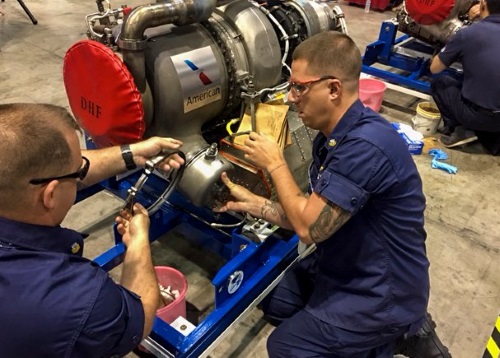
They may even be assigned to the Polar Operations Division in Mobile, Alabama in support of icebreaking operations.
In addition to maintaining avionics systems, AETs take care of aircraft batteries and all controls and functions of airframe systems.
Finally, they may be responsible for ground handling of aircraft and may also fill aircrew positions like radio operator, navigator, and so on.
What Do Avionics Electrical Technicians Do?
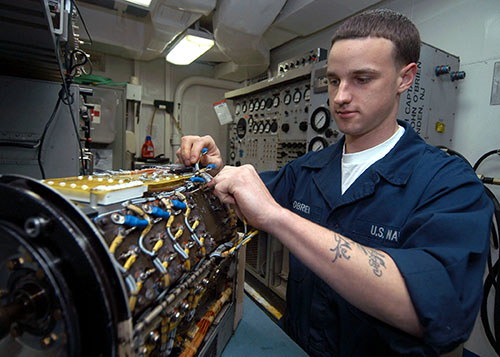
In short, AETs take care of everything relating to avionics systems and the aircraft as a whole.
It is their responsibility to make sure that the avionics systems are able to perform communications, navigation, target acquisition, collision avoidance, and automatic flight-control functions.
AETs also are responsible for conducting routine aircraft inspections and aviation administrative duties, including maintaining the conversion and distribution systems and electrical control.
If necessary, they will fill aircrew positions.
Related Article – How To Join The US Military As A Non-Citizen
How Do You Become an Avionics Electrical Technician?
You will need to be proficient in solving mathematical problems and have a high aptitude for electrical and mechanical problems.
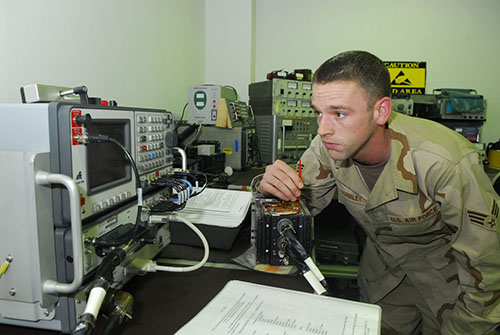
In addition, you will need to pass an aircrew-candidate physical and be able to qualify for a Secret security clearance.
Finally, you’ll have to attend a 24-week-long “A” School that introduces AET students to the knowledge, skills, and abilities required to maintain and service electrical, communication, navigation, and sensor systems as well as the electrical control and indication functions of all airframe systems.
4. Boatswain’s Mate
Found throughout the United States and overseas, you’ll see Boatswain’s Mates (BMs) — the most versatile member of the Coast Guard — everywhere.
Their job responsibilities are actually very similar to those that serve in the US Navy as BM’s.
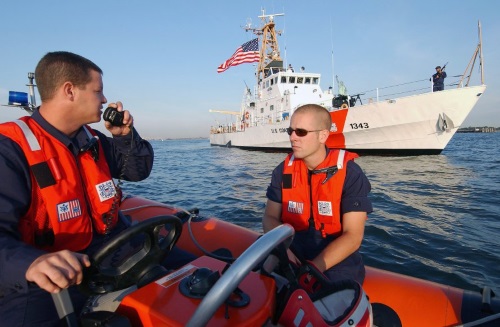
In addition to serving on every Coast Guard cutter, BMs may act as federal law enforcement officers, allowing them to become the officers in charge of coastal patrol boats and small shore units, including search and rescue stations.
They are the face of the Coast Guard and perform all its missions at sea and onshore.
What Do Boatswain’s Mates Do?
BMs can perform almost any task in seamanship from deck maintenance to small boat operations to navigation.
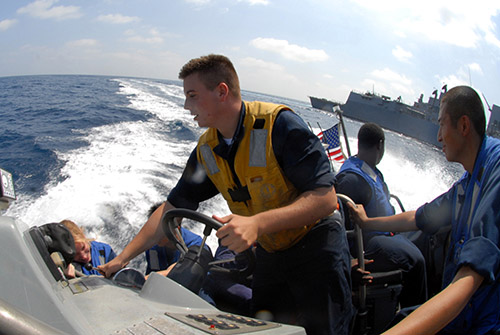
They are responsible for the newest Coast Guard small boats to conduct search and rescue and assist in law enforcement and security operations.
In addition, they are in charge of all personnel assigned to a particular ship or shore unit.
BMs are able to operate cranes and winches to load cargo and have a general knowledge of ropes and cables.
How Do You Become a Boatswain’s Mate?
You need to have leadership skills and physical strength as well as good hearing, normal color vision, and a high degree of manual dexterity.
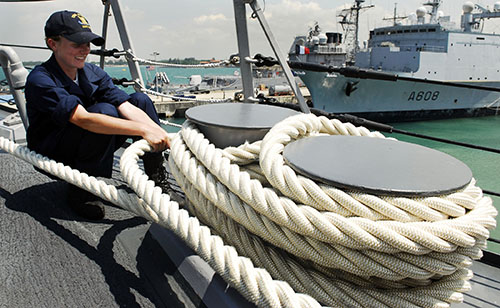
If you have experience handling small boats, even better.
BMs go through 14 weeks of intensive training often at Yorktown, Virginia, or through on-the-job training through a striker program.
Once that training is complete, BMs can go on to advanced training such as coxswain, buoy deck supervisor, command cadre school, and law enforcement, including fisheries.
If you’re looking for the best Coast Guard job that doesn’t involve you being chained to a desk, Boatswains Mates’ are it!
3. Information Systems Technician
Information Systems Technicians (ITs) in the Coast Guard know computers and technology well.
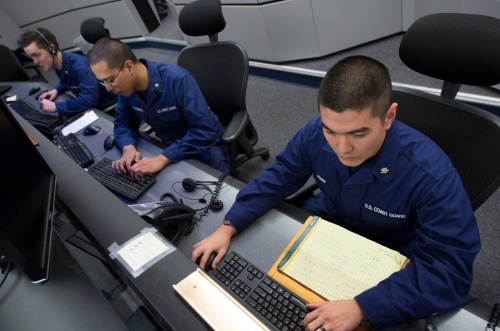
They may work out of geographically centralized shops, communications area master stations, and on major cutters.
It is their responsibility to maintain, repair, and install all computer and telephone equipment, whether onshore or at sea.
Related Article – Navy Information Systems Technician (IT): Career Details
What Do Information Systems Technicians Do?
ITs who serve at sea are responsible for supporting tactical command, control, communications, and computer systems.
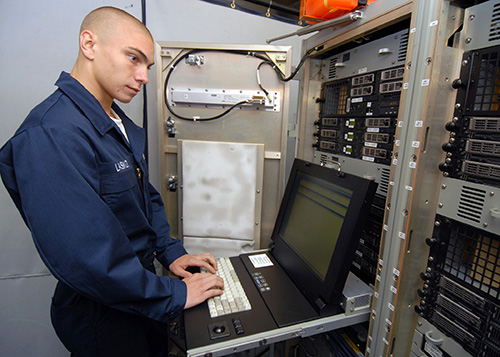
Those who serve onshore are responsible for maintaining computer, analog, and digital voice systems in addition to maintaining the physical network infrastructure that connects the systems together.
How Do You Become an Information Systems Technician?
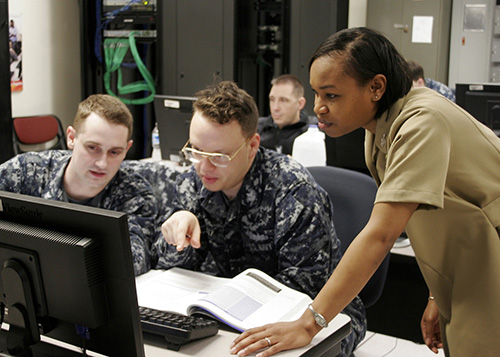
You’ll need to have an interest in telephone and computer systems and be very detailed in your work.
While it’s helpful to have prior training or knowledge in telephone and computer systems maintenance, it’s not required.
You just need to be better than average in solving math problems!
Because ITs need a vast amount of electrical theory and practical hands-on skills, you’ll have to attend the longest “A” school in the Coast Guard of 31 weeks.
Located in Petaluma, California, the IT “A” school will teach you everything you need to know about maintaining telephone, network cabling, and computer systems.
“C” schools are available to mid-career ITs responsible for maintaining telephone systems, and high-performing ITs are allowed to compete for selection to the advanced computer, engineering, and technology program.
Those selected receive two years of full-time paid-for college in order to receive an associate’s or bachelor’s degree in engineering or technology.
2. Rescue Swimmer
When most people think of the Coast Guard, they usually think of one thing: rescue swimmers.
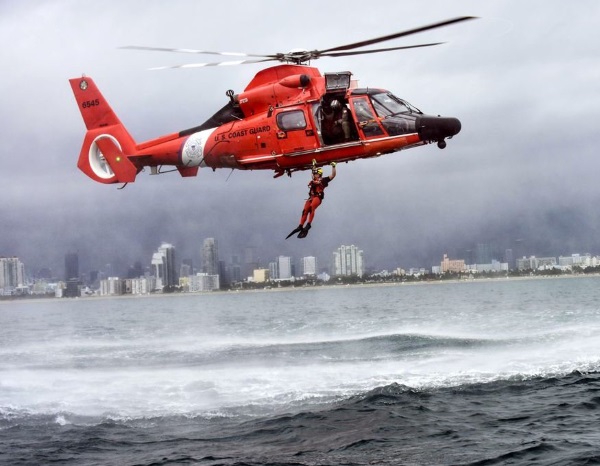
Officially known as Aviation Survival Technicians, they’ve been made relatively famous thanks to Hollywood blockbusters like The Guardian and The Finest Hours.

It truly is one of the best jobs you can have in the Coast Guard.
That is, of course, if you can make the cut!
Becoming a Coast Guard rescue swimmer is one of the most demanding and difficult jobs to hold.
With that said, it’s also one of the most prestigious jobs out there.
What Does A Rescue Swimmer Do?
When everyone else is heading back into port because of bad weather, you’ll be doing the opposite: heading into harm’s way.
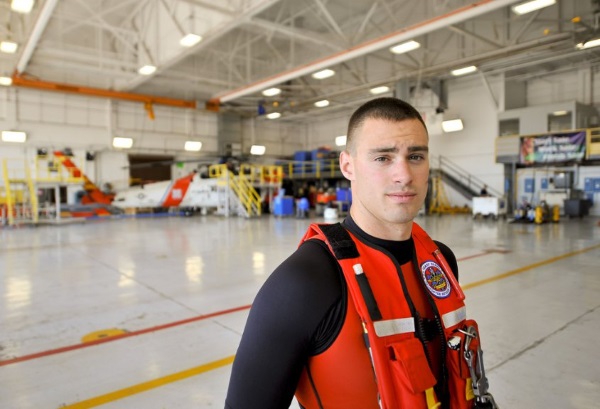
Rescue swimmers are tasked with doing exactly what you would think; rescuing people from rough seas!
The Coast Guard will routinely receive SOS and distress calls in all types of weather.
They are tasked with going out and rescuing people in distress, and do a mighty fine job of it!
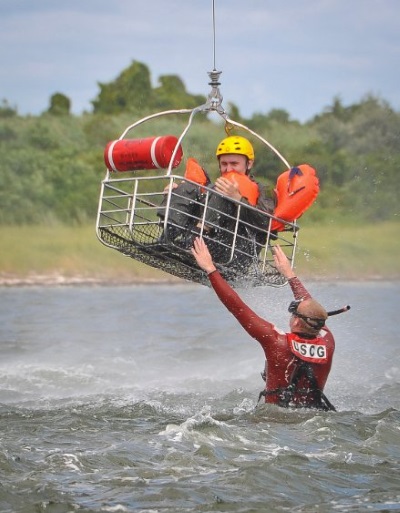
In 2017 alone, they were credited with saving over 4,100 lives! (Source)
It truly is an honorable and enviable job, and to top it off, they also can serve in some of the coolest places you can think of.
How Do You Become A Rescue Swimmer?
Unlike the other Coast Guard jobs on this page, you need to be in incredible shape before you even try out.
Not only do you need a high level of mental acuity and military bearing, but you also need to be a heck of a swimmer!
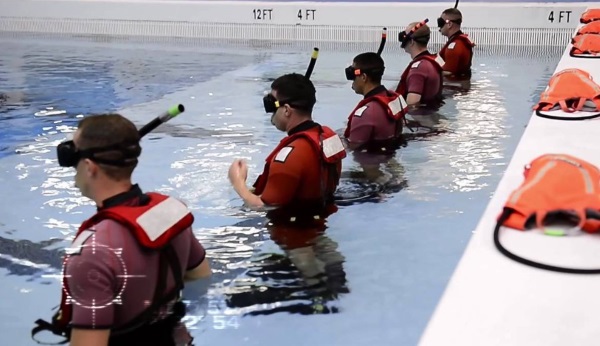
The minimum physical standards to even begin training are as follows:
- Shoulder width push-ups: 50
- Sit-ups: 60
- Pull-ups: 5
- Chin-ups: 5
- 500-yard Crawl Swim: 12 minutes or better
- 25-yard underwater swim: Repeat 4 times without surfacing on each try
- Buddy Tow: You must be able to pull someone through the water for 200 yards, either across your chest or with a lifesaving device
Once you pass that, you then have a shot at becoming a rescue swimmer.
The training and selection is actually considered to be one of the toughest in the US Military, even comparable to certain portions of the Navy SEALs training.
In fact, in some cases, the drop-out rate has approached the 80% mark!
Throughout your selection period, which lasts 22 weeks, you will be tasked with things like:
- How to approach, carry, and release a survivor
- Detangling various types of parachutes and backpacks
- Long periods of swimming and breath holds
- Advanced life-saving techniques
1. Direct Commission Aviator (Helicopter Pilot)
In my opinion, the coolest job you could have in the Coast Guard is helicopter pilot.
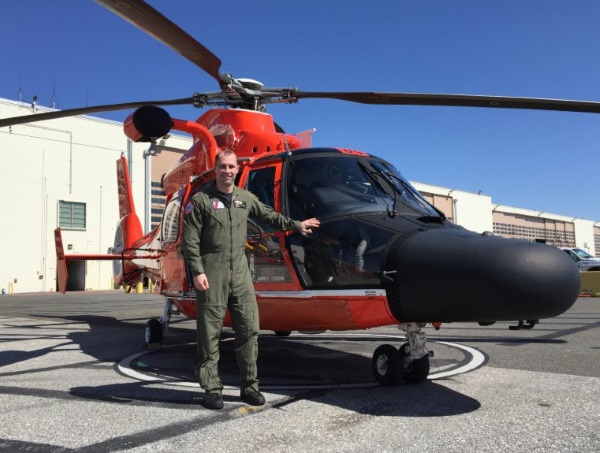
Officially designated as a Direct Commission Aviator, Coast Guard pilots fly two types of rotary aircraft:
- Sikorsky MH-60T Jayhawk
- Airbus MH-65 Dolphin
What Does A Coast Guard Helicopter Pilot Do?
The US Coast Guard is tasked with a wide variety of responsibilities but primarily focuses on search and rescue and drug interdiction.
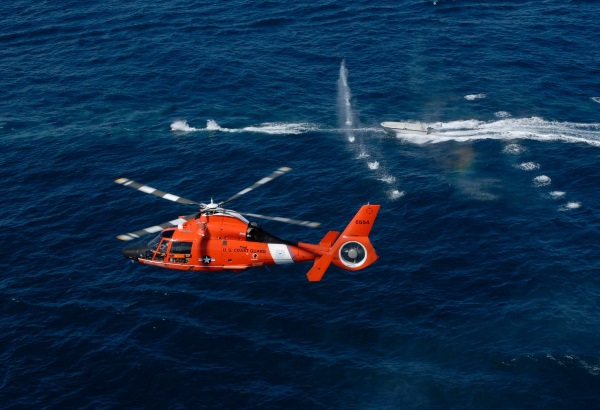
They respond to calls of distress, and will fly in some of the worst weather mother nature throws at them to rescue civilians.
They also will rescue downed military and civilian aviators, and work hand in hand with the other branches of the military.
Drug interdiction involves tracking and intercepting seagoing vessels and aircraft that are smuggling in illicit drugs, as well as human trafficking.
Related Article – US Army High School To Flight School: How To Get In And More
How Do You Become A Direct Commission Aviator?
Unlike the other careers listed on this page, the path to becoming a helicopter pilot in the Coast Guard is significantly more difficult.
It’s estimated that there are only 800 pilots in the Coast Guard, and out of those 800, only around 600 of them are actually helicopter pilots.
In order to become a Coast Guard pilot, you need to first become an officer.
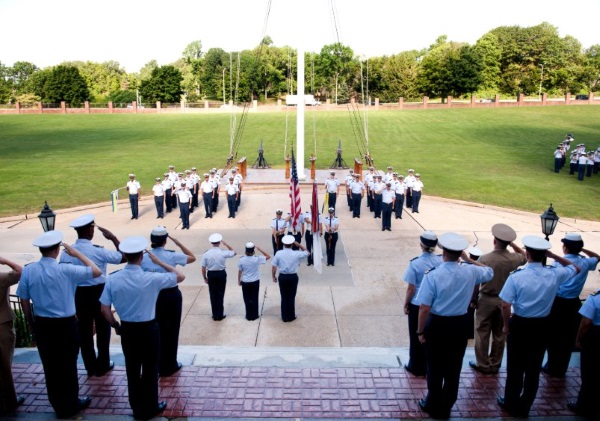
As an officer, you must have at least a bachelor’s degree and graduate from the 17-week Officer Candidate school.
Alternatively, you can be a graduate of one of the other service branch’s flight schools, like the Air Force’s Undergraduate Pilot Training (UPT) or the Army’s aviation school.
In addition, you need to pass a rigorous physical exam, which includes things like:
Vision Test
Your vision must be correctable to 20/20 and uncorrected vision must be at least 20/50.
Additionally, you must have normal depth perception and not be color blind.
Lastly, they will test your field of vision, as well as check your eye reflexes.
Flight Physical
They will run routine blood work, as well as check your urine for illicit drugs.
They will also conduct a routine chest X-ray, as well as check your ears, nose, and throat.
Lastly, they will examine any mental, neurological, or cardiovascular abnormalities.
Coast Guard Flight School
Once you pass your flight physical, the real fun begins.
What’s interesting to note is that even though you’ll be flying helicopters upon completion of your training, all Coast Guard aviators (helicopter included) learn to fly fixed-wing aircraft first.
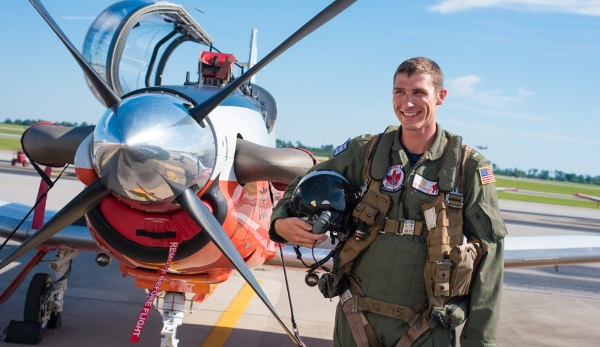
Students first learn to fly the T-6 Texan II at Pensacola Naval Air Station, Florida.
Once that phase of the training is completed, they will then move on to the rotary wing (helicopter) training portion.
The whole process takes about 2 years from start to finish, at the end of which you’ll be stationed in any one of the numerous Coast Guard bases throughout the US.
Related Article – Coast Guard Ranks And Pay
Conclusion
And there you have it: the 5 best jobs in the Coast Guard you can have in 2023.
Keep in mind that each of these jobs (except helicopter pilot) are available via both the officer and enlisted paths.
Many of these jobs are in demand in 2023, so if you’re on the fence about joining up you should keep that in consideration.
Obviously, it makes sense to choose the right career path for you, and the Coast Guard may not always necessarily be the right choice.
One of the easiest ways to figure that out is to ask yourself a few questions:
Would I enjoy being on a small ship for months at a time?
Would I benefit from joining a larger branch of the military, like the Army, Navy, or Marines?
What kind of job would I like to do after my service is up?
Your best bet would be to contact a local Coast Guard recruiter before you start signing anything.
They will be able to guide you in the right direction better than anyone else can.
With that said, you should definitely consider one of the above Coast Guard jobs if you’re looking for an exciting career in the military!
Related Articles
Coast Guard Grooming Standards
- Navy Signing, Enlistment, and Reenlistment Bonuses - June 19, 2024
- Navy Health Professions Scholarship Program (HPSP) Guide - June 19, 2024
- Navy Nurse - June 19, 2024


Boatswain’s mate, in top five, we us to say two type of people in the Coast Guard “DC’s and those that want to be DC’s”. If you can’t make rate go Boatswain Mate.
Semper Paratus